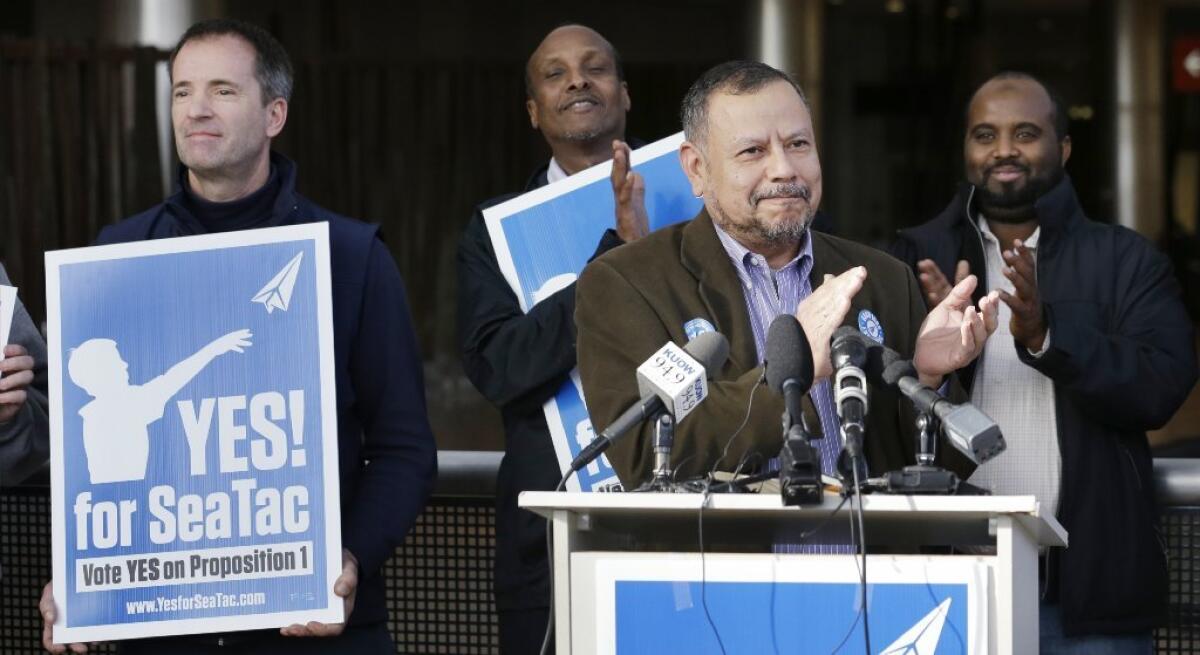Congress passes the buck, so localities bump up the minimum wage

- Share via
State and local governments haven’t always used their role as the “laboratories of democracy” wisely or for the general good. (The phrase reaches us indirectly from the great progressive Supreme Court Justice Louis Brandeis.) But the expanding movement to increase state and local minimum wages is an encouraging sign of wisdom in the grass roots.
The most recent example comes from the small Washington city of SeaTac, which as you might surmise is the location of Seattle-Tacoma International Airport. The residents of this working-class community voted last month to set a minimum wage of $15 an hour for airport and hotel workers within its borders. The measure, which passed by a razor thin margin, is still subject to a recount, but if the vote holds, SeaTac will have the highest minimum wage in the country.
This summer, California Gov. Jerry Brown signed a law raising the state hourly minimum wage to $10 by 2016. San Francisco’s minimum is set to rise to $10.55 on Jan. 1, thanks to a 2003 local law that tied the rate to inflation. The Washington, D.C., City Council will vote this month on a proposal to raise its minimum wage to $11.50. This is an arms race that can only do good.
Nor is it only a progressive’s battle. Silicon Valley entrepreneur Ron Unz is pushing a measure for the November ballot that would raise the state minimum to $12 in 2016. Unz, who ran for the GOP nomination for governor against Pete Wilson in 1994, was last heard from as the backer of Proposition 227 in 1998, which eviscerated bilingual education in California.
Unz is promoting the minimum wage hike as a an economic growth measure -- putting $15 billion a year into the pockets of workers who would spend it would be “one of the largest economic stimulus packages in California history, funded entirely by the private sector,” he told KQED’s California Report.
He’s also making the eminently sensible argument that requiring employers to pay their workers a living wage relieves the taxpayers of that burden: “What we have is a system in which employers have privatized the benefits of their workers; they get all the labor, while they’ve socialized many of the costs, forcing the taxpayers to cover the living costs of their own workers, which is ridiculous.” Wal-Mart and McDonald’s aren’t doing their communities any favors by paying their workers so little they become wards of the taxpayers.
All this is happening in a federal vacuum. President Obama has recently voiced his support for a federal minimum wage of $10.10, after having earlier supported an increase to $9. To some extent his support doesn’t matter, because any effort at the federal level is certain to be stymied by conservatives in Congress.
So it’s up to municipalities and the states. It’s gratifying to see that for them, the real downside of skinflint employers has trumped the conservative push-back against a higher minimum wage. It’s important to remember that the old argument against the minimum wage -- that it costs jobs -- is entirely undocumented despite being “one of the most studied topics in all of economics,” as economist John Schmitt observes.
It’s also proper to note that the federal minimum wage hasn’t kept step with worker productivity since 1968; if it had, the rate would be about $17 today.
The states’ role in promoting a higher minimum wage isn’t new. In the 1930s, increases in New York and Washington state landed before the Supreme Court. The court overturned New York’s in one of the decisions that inspired Franklin Roosevelt’s court-packing campaign. Seeing the handwriting on the wall, the court reversed itself and OK’d the Washington measure, which was almost identical.
That’s when the laboratories of democracy were percolating along, focused on bettering citizens’ lives instead of trying to narrow women’s reproductive rights and disenfranchise minority voters, two of the more noxious state-based movements today. The minimum wage measures show that sometimes localities can fill a congressional vacuum with healthy air.
More to Read
Get the L.A. Times Politics newsletter
Deeply reported insights into legislation, politics and policy from Sacramento, Washington and beyond. In your inbox twice per week.
You may occasionally receive promotional content from the Los Angeles Times.











